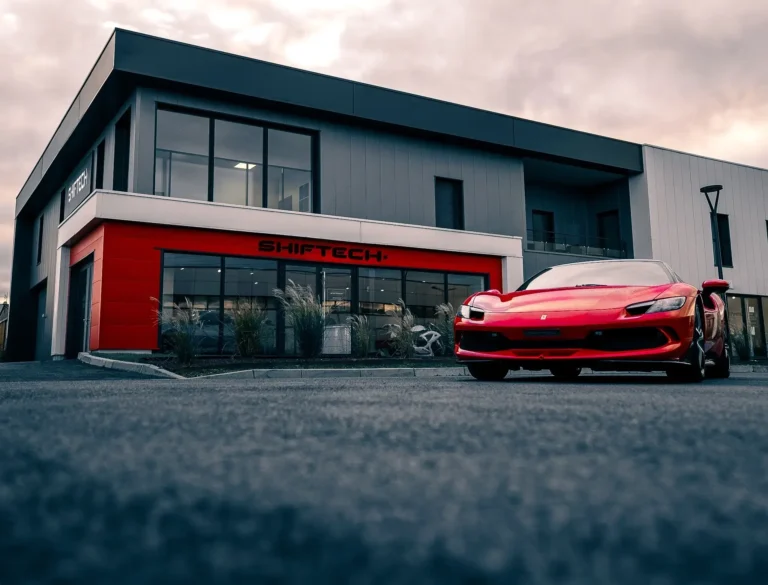Why are German manufacturers so popular?
In the global automotive industry, German brands stand out for their unwavering reputation for quality, performance, and innovation.
Whether it’s iconic models like the Volkswagen Golf or luxury vehicles like the Mercedes-Benz S-Class, these manufacturers seem to have the magic formula for attracting consumers. Yet, despite the recent challenges they face, their appeal remains strong, both for enthusiasts and buyers looking for a reliable vehicle. Reputation and History German car manufacturers, such as Volkswagen, BMW, and Audi, have built a solid reputation over the decades. Their history is marked by landmark innovations that have shaped the automotive industry. For example: The Volkswagen Beetle, an iconic model launched in 1938, made history with its unique design and global popularity. Audi pioneered the development of all-wheel drive with its famous quattro system. The launch of the Mercedes-Benz 300 SL with its gull-wing doors in 1952 redefined automotive luxury. These innovations not only enhanced the driving experience but also set standards to which other manufacturers aspired. The brand identity, rooted in a tradition of precision and refined engineering, gives German vehicles a prestige that attracts customers from around the world. Discover why German manufacturers shine in the automotive market: quality, innovation, performance, and a solid reputation. Dive into the world of German brands and understand the keys to their success. Brands that embody excellence. Major brands, such as Porsche and Ford Germany, have positioned themselves not only as market players but also as cultural icons. The image of Porsche, with its sports models like the 911 , evokes performance and elegance. At the same time,Ford Germany
has successfully combined heritage and modernity, offering models adapted to new consumer expectations.
Quality and Superior Engineering One of the elements that distinguishes German manufacturers is their unwavering pursuit of quality. Their vehicles are renowned for their high manufacturing standards, resulting in exceptional durability and reliability. Here are some key points:Brand Year Founded Main Reputation Volkswagen1937
- Reliability and Affordability BMW1916
- Performance and Luxury Mercedes-Benz 1926
- Innovation and Luxury Audi 1909
Technology and Design

1931
Sportiness and Engineering Some brands, such as Mercedes-Benz stand out for the use of premium materials and advanced technologies in the design of their vehicles. Furthermore, German engineering is characterized by attention to detail, which contributes to operational excellence.Discover the reasons why German manufacturers are undisputed leaders in the automotive industry. Analyze their reputation, quality, innovation, and performance, which appeal to consumers around the world. Technological InnovationRecent technological developments, such as hybrid and electric vehicles, once again demonstrate German manufacturers’ commitment to innovation. Models like the Audi e-tron and the Mercedes EQ are making waves in the market while meeting increasing environmental standards. They strive to stay ahead by integrating latest-generation infotainment systems and advanced safety features. Performance and Driving PleasureThe performance of German cars has always been at the heart of their design. Brands like BMW and Porsche are dedicated to delivering an unparalleled driving experience thanks to powerful engines and sophisticated chassis. Here are some of their special features: Modern turbocharged engines ensure rapid acceleration and increased responsiveness. 💨
Sophisticated suspension systems guarantee exceptional handling, even in difficult conditions. 📈
Autonomous driving technologies are beginning to be integrated, enhancing comfort and safety.
| These elements help create an emotional connection between the driver and their car, a determining factor for many buyers. Car enthusiasts often seek this advertising, and German brands support this connection. | Automotive Design and Aesthetics | German cars aren’t just high-performance; they also captivate with their design. The clean, functional style of models like the |
|---|---|---|
| BMW 3 Series | or the | Mercedes-Benz C-Class |
| is the result of careful consideration of aesthetics. Here are some elements that play a key role: | Clean, modern lines create an elegant appearance, instantly catching the eye. ✨ | Each vehicle is designed with ergonomics in mind, offering a more intuitive driving experience. |
| Luxurious interiors, featuring premium materials, instill an atmosphere of comfort and refinement. | This attention to detail makes German cars a popular choice among buyers looking for a vehicle that not only performs well but is also aesthetically pleasing. Design not only enhances brand image; it also plays a key role in purchasing decisions. | Discover the reasons behind the popularity of German manufacturers. Quality, innovation, and performance are at the heart of their success, attracting millions of buyers around the world. Dive into the world of German automobiles and explore what makes them so sought-after. |
| Commitment to Sustainability | As the automotive world moves toward greater sustainability, German manufacturers are taking concrete initiatives to reduce their environmental impact. This includes investing heavily in the research and development of electric and hybrid models. Here are a few examples: | Volkswagen |
| aims to transition to an all-electric fleet by 2030. ⚡ | Audi | and |
Porsche are developing new electric models to meet growing market demand. Many manufacturers are adopting more environmentally conscious manufacturing practices, such as reducing waste and using recycled materials. These efforts demonstrate not only a response to regulatory requirements, but also a desire to actively engage in environmental conservation, thus attracting consumers who are increasingly aware of their ecological footprint.

Currently, the global automotive market faces numerous challenges, particularly in terms of competition and demand. German brands, although renowned, must navigate a complex environment. Here are some analytical elements:
Manufacturer Global Market Share Expected Growth 2025 Volkswagen 12%
Stable with a focus on electric vehicles
BMW 6% Positive, with growth in hybrids Mercedes-Benz 7%
- Increase thanks to technological innovation
- Audi
- 5%
Increasing with new launches
Porsche
2% Positive economic situation thanks to improved sports models Faced with new entrants, particularly Chinese manufacturers, the European automotive sector must reinvent itself. German brands continue to prove their worth, but constant vigilance is necessary to anticipate emerging consumer trends. https://chanoine.fr/pourquoi-acheter-une-voiture-doccasion-en-allemagne-les-avantages-expliques/ Socioeconomic Impact and Jobs
- German automakers play a vital role in the German economy and that of several European countries. They represent a key source of employment, from factory work to research and development. Here are some key points:
- More than 800,000 direct jobs are linked to the automotive industry in Germany. 👷♂️
- Manufacturers contribute significantly to the local economy, supporting numerous indirect jobs.
Training and innovation continue to be a key focus, ensuring a skilled workforce for the future. As the automotive sector evolves, the impact of these manufacturers’ strategic decisions on employment and the economy remains crucial. This is why their sustainability is closely monitored in all the countries where they operate.


Discover the Ligier JS50: the vehicle that revolutionizes compact driving
The Ligier JS50 is positioned as an essential reference in the world of license-free vehicles, offering a driving experience that is both practical and modern. Thanks to its sporty design and electric performance, this model represents pure innovation for those…
Find out why the Mobilvetta K-Yacht Tekno Line 80 will revolutionize your camping vacation!
The world of camping is changing rapidly, and the Mobilvetta K-Yacht Tekno Line 80 is at the forefront of this revolution, redefining camping holidays like never before. With its sophisticated design and high-end features, this recreational vehicle brings unprecedented comfort,…

Rep. Dingell expresses displeasure with China’s ‘demands’ for electric vehicles
Recently, U.S. Representative Debbie Dingell spoke out during a heated debate about China’s increasing demands for electric vehicle regulations. This topic sparked intense debate about trade policy and how American companies, such as Tesla, Nissan, and Renault, could be affected.…






